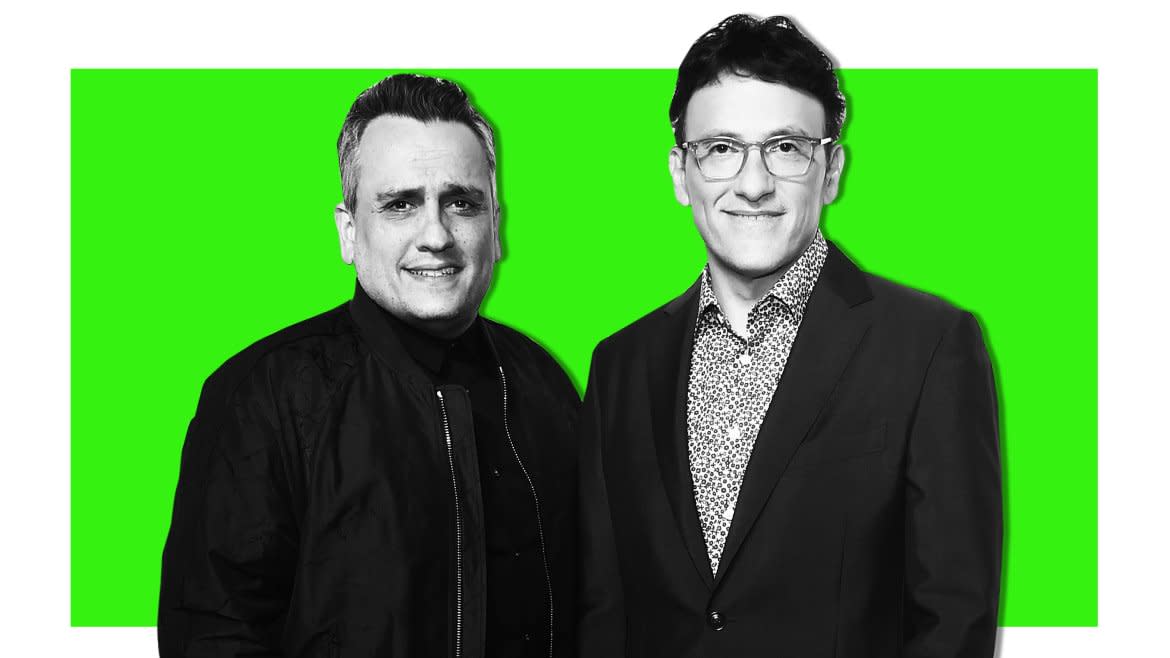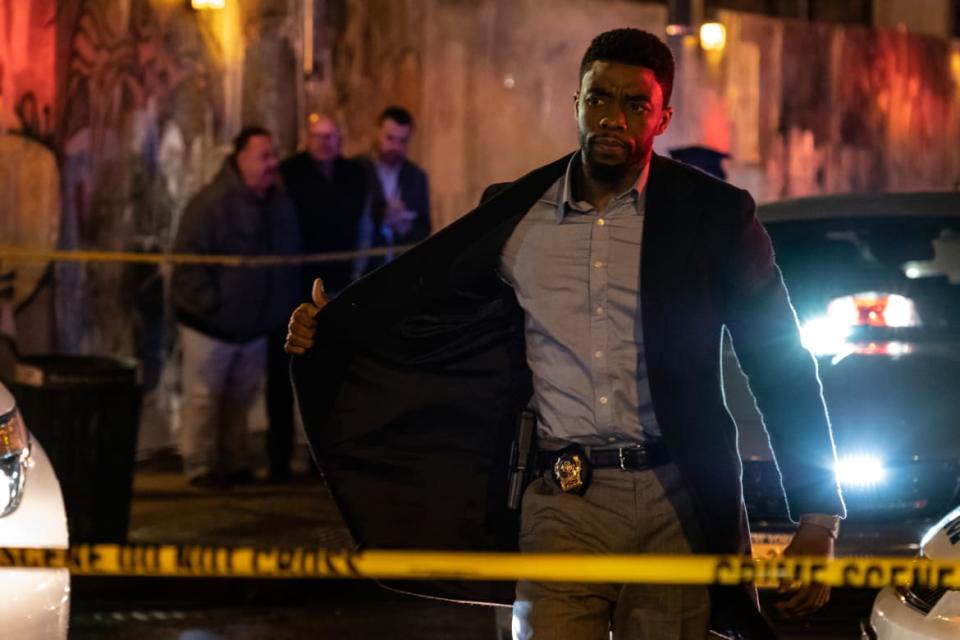‘Avengers: Endgame’ Directors Joe and Anthony Russo on Scorsese’s ‘Absurd’ Stand Against Marvel

As most things go with Joe and Anthony Russo, their latest project is a family affair—both by blood and the bonds forged on set. The brother-directing-duo were driven to produce 21 Bridges, a propulsive crime thriller starring Chadwick Boseman, out of an emotional connection to the ’70s classics it reminded them of, the ones they grew up watching with their father. Movies about cops, smugglers, or failing justice systems like The French Connection, The Taking of Pelham 123, or ...And Justice For All were “very important to our childhood and signify the relationship that we had with our father,” says Joe by phone on a Sunday afternoon, days ahead of 21 Bridges’ release.
“We grew up in Cleveland in the ’70s and ’80s when our dad was a bit of an activist-politician,” adds Anthony of their dad, Basil Russo, a Democrat attorney and former judge and city councilman who campaigned for mayor in 1979 against his party’s incumbent, Dennis Kucinich. “That was a time when there was a lot of economic strife, a lot of social strife, and this sense that the system was failing people. When you’re in a situation like that, the idea of going outside the system, of criminality, it all of a sudden becomes viable for some people.”
21 Bridges doesn’t have to look far to find how that same desperation manifests in present-day America.
Why Martin Scorsese’s War on Marvel and Disney Actually Matters
Boseman stars as Andre Davis, a New York City detective leading a Manhattan-wide manhunt for two young drug smugglers suspected of massacring seven cops. The closer Davis comes to cornering his suspects—after devising a plan which includes shutting down Manhattan’s tunnels, trains, and all 21 bridges leading in and out of it for one night; this is a horror movie for New Yorkers—the more he uncovers unsettling shades of gray in the investigation. Before long, the divide between good guys and bad guys is muddied. Both Davis and the youngest smuggler, Michael (Stephan James), emerge as unwitting cogs in corrupt cycles outside their control.
Telling a story about modern-day policing in New York, however, demands a considered approach to its condemnable excesses and shortcomings, and to the individuals doing the best they can with what they have, both in and outside of the force. “Look, there have been a lot of controversies about police corruption in the news over the past several years now, and I think that’s part of the difficulty of the issue,” says Anthony. “There isn’t really a black-and-white to it all. There’s good people on all sides of the issue trying to do the right thing in a very difficult situation. If we were going to make a modern-day police corruption movie, we wanted to be reflective of those complexities.”
The Russos came aboard 21 Bridges after being exposed to an early draft of the film’s script, penned by Matthew Michael Carnahan. (The brothers produced Carnahan’s directorial debut, the Iraq war drama Mosul, through their studio AGBO; the project releases next year.) “The central concept of the movie was kind of irresistible to us: the idea that a specific crime is committed and because of its nature and its severity, the solution is to lock down the island of Manhattan for one night,” Anthony explains. Their back-to-back commitments to directing Marvel’s Avengers: Infinity War and Avengers: Endgame barred them from directing this one, too. But after five years in the Marvel movie machine, the brothers are adept at assembling a team.
The film’s credits are littered with names familiar to the Russos’ orbit, apart from Carnahan. Boseman, for one, made his groundbreaking debut as the superhero Black Panther in the Russos’ second entry in the Marvel universe, Captain America: Civil War. And composer Henry Jackman scored that film, Captain America: The Winter Soldier, and two upcoming Russo projects: the Chris Hemsworth-starring Dhaka and the Cleveland-set crime thriller Cherry, starring Tom Holland, aka Spider-Man—except here he’s got a shaved head and a gun. Working with the same group of talent “creates a shorthand for all of us,” says Joe, between effusive praise for Holland’s work on Cherry (“one of the best performances we’ve ever had the pleasure of directing”) and for Boseman (“a beautiful person with a very big brain”) and Hemsworth (“an incredibly sophisticated and underrated actor”).
All three actors co-starred in Endgame, which in July became the top-grossing movie of all time after 13 weeks at the box office, surpassing James Cameron’s Avatar. The saga-concluding film marked an emotional high for the Marvel franchise—one that the brothers say refutes their fellow director Martin Scorsese’s claim that Marvel movies are not examples of true cinema. “Many of the elements that define cinema as I know it are there in Marvel pictures,” Scorsese clarified earlier this month in an op-ed. “What’s not there is revelation, mystery or genuine emotional danger. Nothing is at risk. The pictures are made to satisfy a specific set of demands, and they are designed as variations on a finite number of themes.”
“We choose to define cinema as a film that binds people together and creates a sense of community around the narrative,” says Joe. He explains that Endgame’s box-office success is a “signifier of emotional success” more than an economic one. “Very few movies in history have been able to bring audiences around the world together and have an emotional experience in a movie theater. We were in those theaters when that movie premiered and heard at every screening the cheers and the audible sighs and the cries of anguish and the cries of surprise. It’s very rare that that happens with several hundred people together in a theater. In a lot of ways it felt historic.
“But, you know, ultimately it’s tough to have any kind of dialogue about this because the perception is that, I don’t think Scorsese’s actually seen the films,” he adds. “So it’s hard to have an intellectual conversation with someone who hasn’t seen the movies.”
Anthony agrees. “It seems almost absurd to dialogue about it with somebody who’s so ill-informed. And then secondly, it’s like, look, the second you try to put art inside a box, I mean, it’s going to turn on you.”
“And defy you,” Joe jumps back in. “It seems anathema to the very nature of art to try to define it. But at the end of the day, what do we know? We’re just two guys from Cleveland, Ohio. I think ‘cinema’ is a New York word. In Cleveland, we just call them ‘movies.’”

Chadwick Boseman stars in 21 Bridges
After Endgame’s release, the brothers announced that they’d be stepping away from the Marvel universe for the foreseeable future. But of course they’d happily consider helming another Marvel film if “the right project comes along at the right time,” Anthony says. “Our experience there was among the very, very best of our careers. We love those films. They’re very personal to us and an important part of our growth as filmmakers. We would love to work there again.”
The Russos have made no secret of their enthusiasm for a potential adaptation of Marvel’s 1984 Secret Wars, the first big Marvel Comics event series. The original 12-issue book, penned by then-editor-in-chief Jim Shooter with art by Mike Zeck and Bob Layton, saw heroes and villains from across Marvel’s titles—including the X-Men and Fantastic Four—duke it out in an alternate universe. “It was one of the most influential books,” says Joe, remembering reading every issue in one sitting as a kid. “This notion of heroes coming together, all those complex personalities and villains coming together. We’re guys who, as storytellers, love to portray villain characters as emotionally complicated and partly empathetic at times. Because we don't believe that anyone is truly all good or truly all bad, we’re all a mix of both, though heroes tend to lean more towards good and villains tend to lean more toward bad.”
Civil War, Infinity War and especially Endgame each made a point of grouping unlikely characters together, creating new allies and frictions along the way—a skill the brothers could see themselves bringing to another most ambitious crossover event in history. “Secret Wars just seems like a prime opportunity to explore the personalities of the characters and the way that they interact with each other,” Joe adds. “And for alliances to be formed in odd ways that the audience isn’t expecting. It’s just got a really high concept that could be executed on a larger scale.”
He knows just the guys to do it.
Got a tip? Send it to The Daily Beast here
Get our top stories in your inbox every day. Sign up now!
Daily Beast Membership: Beast Inside goes deeper on the stories that matter to you. Learn more.

